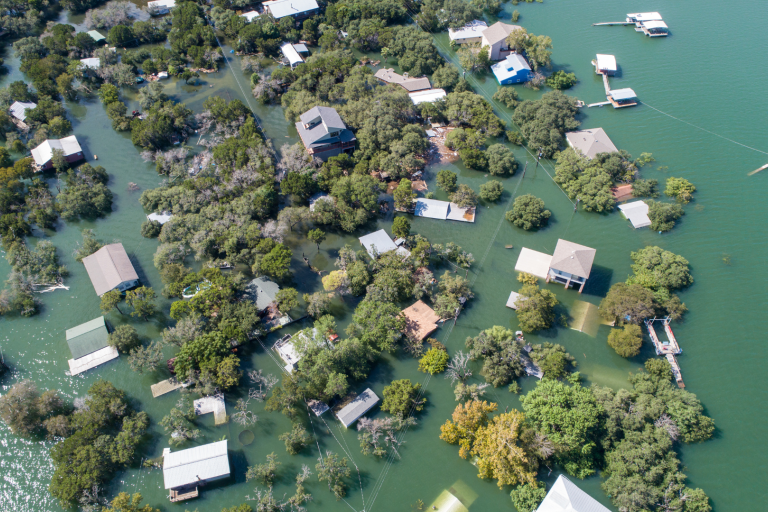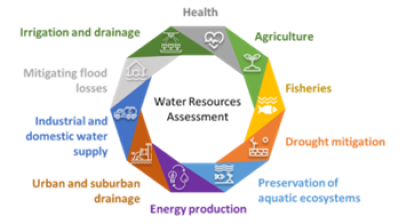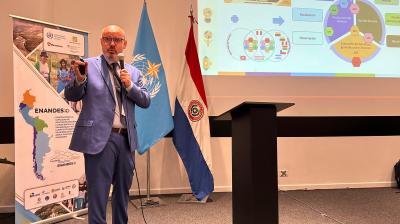Early Warnings for All developments in Hydrology
Meetings with representatives from target countries were conducted in the Southwest Indian Ocean and the Pacific at the beginning of 2024 to introduce Early Warning Systems for Floods and the Flash Flood Guidance System (FFGS) for Small Island Developing States (SIDS), while a FFGS training was conducted in Kabul, Afghanistan.
Flash Flood Guidance System (FFGS) with Global Coverage Sustainability Phase
Flood forecasting warning systems (FFWSs) play a crucial role in safeguarding communities from flash floods. The Flash Flood Guidance System (FFGS) Phase 4 (2023 – 2026, Sustainability Phase) focuses on:
- Enhancing Operational Systems: working with partners (USAID/Bureau for Humanitarian Assistance (BHA), National Oceanic and Atmospheric Administration (NOAA), Hydrologic Research Center (HRC)) to strengthen the existing FFWSs infrastructure in 74 countries and ensure continued access to real-time flash flood forecasting data and timely warnings.
- Investing in Sustainability: laying the groundwork for the sustainable operation and maintenance of FFWS (through training and research alongside ongoing FFWS analysis), with the goal of ensuring safe progress in the FFGS Sustainability Plan. FFGS responsibilities will progressively transition to WMO Members for local, regional and global scale flash flood forecasting.
- Expanding Coverage: expanding FFWS coverage to 34 new countries (for a total of 108 countries covered). Workplans have been developed for:
- West and Central Africa: 24 countries, in coordination with CREWS West Africa and CREWS Central Africa
- South West Indian Ocean: 4 countries, in coordination with CREWS SWIO
- Pacific Region: 6 countries
Special Focus on SIDS: Early Warning Systems for Floods (EWS-F) and Landslides
Small Island Developing States (SIDS) are particularly vulnerable to floods. EWS-F is taking a targeted approach to address this challenge by focusing on building capacity for early warning systems in 13 SIDS (Antigua and Barbuda, Barbados, Comoros, Fiji, Haiti, Kiribati, Madagascar, Mauritius, Samoa, Seychelles, Solomon Islands, Tonga, and Vanuatu). Joint FFGS and EWS-F online meetings with representatives from target countries have been conducted in key regions, the Southwest Indian Ocean (February 2024) and the Pacific (March 2024). The goal of the meetings was to introduce the fundamentals of the FFGS and EWS-F projects and the commitments and activities required for their successful implementation.
CREWS Afghanistan
The CREWS Afghanistan project successfully conducted a workshop in Kabul (22 January - 1 February 2024) focusing on operational FFGS training. This initiative, supported by the Pakistan Meteorological Department, aimed at enhancing the operational use of FFGS in Afghanistan and equip a diverse group of participants, including 34 experts and operational staff from various agencies (meteorology, hydrology, agromet, and disaster management authorities) with the necessary skills to utilize the FFGS effectively.
Supporting Integrated Flood Management
The Associated Programme on Flood Management (APFM) is a WMO - Global Water Partnership joint initiative, which supports practitioners, academia, policymakers, and other stakeholders on the application of the Integrated Flood Management (IFM) concept through the IFM HelpDesk, which is available for users to request assistance. 10 requests were responded successfully between January and March 2024 by the APFM Technical Support Unit (TSU) and support Base Partners on topics related to IFM. The IFM HelpDesk is available online for NMHSs to request technical assistance on various topics related to flood management.










